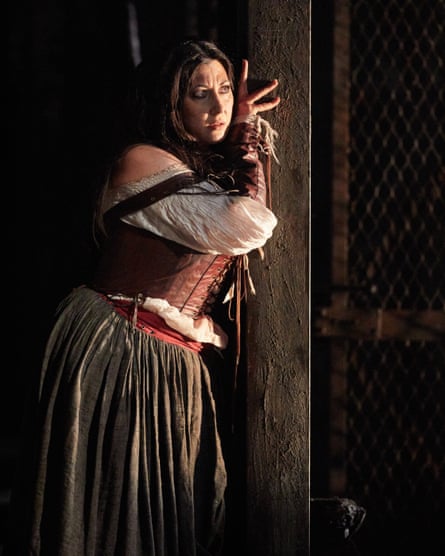The Royal Opera has opted for a revival of David McVicar’s brooding 2001 production of Verdi’s Rigoletto for what is effectively its Christmas show: a big, double-cast run that lasts well into the new year. The staging has been reworked, in places substantially, by Justin Way, who has attempted to restore the edgy moral probing and underlying sense of violence that have slipped from view in some of its recent outings.
Way heightens our awareness of the corruption at the Mantuan court by making the opening orgy more explicit than on previous occasions, and by stressing the courtiers’ monstrous insensitivity to Rigoletto and Gilda in the second act.
Monterone’s daughter, meanwhile, whom McVicar, flying in the face of the libretto, controversially brought on stage, has been reimagined as a victim of abuse rather than a consensual participant in the Duke’s world. As a result, Verdi’s equation of political and sexual power is forcefully underscored, though we’re also precariously close to losing sight of the deceptive charm that makes the Duke himself so dangerously attractive a figure.

The opening night was dedicated to the memory of Dmitri Hvorostovsky, who sang the title role in one of the production’s most memorable and cogent revivals in 2010. This doesn’t have quite the same consistency, despite fine individual achievements. Rigoletto is played by the Greek baritone Dimitri Platanias, imposing on stage, handsome of voice, and deeply touching in his duets with Sofia Fomina’s Gilda, where we get a real sense of Rigoletto’s solicitous affection for his daughter. He’s less successful, perhaps, in his scenes with the courtiers and Michael Fabiano’s Duke, where his irony and rage don’t always hit home.
A couple of tremulous high notes apart – first night nerves, perhaps – Fomina beautifully suggests Gilda’s credulous vulnerability, and gives us an exquisite Caro Nome after being taken in by Fabiano’s calculated ardour in their duet. His Duke, charismatic yet predatory, is all ringing top notes and hectoring authority. Nadia Krasteva is the full-on Maddalena, and there’s an excellent Sparafucile from Andrea Mastroni – coolly self-controlled and genuinely sinister. In the pit, Alexander Joel admirably prefers low-key subtlety to melodramatic extremes, though the cumulative tension slips on occasion.
- At the Royal Opera House, London, until 16 January. Box office: 020 7304 4000.

Comments (…)
Sign in or create your Guardian account to join the discussion